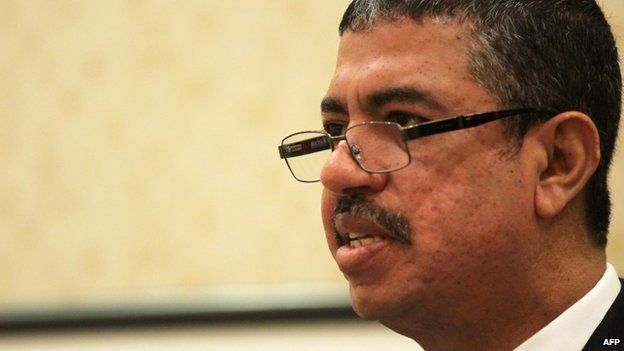Yemen conflict: PM Bahah returns from Saudi exile
- Published

Yemen's Prime Minister Khaled Bahah and several of his ministers have returned after months of exile in Saudi Arabia.
Mr Bahah - who is also vice-president - and his cabinet will stay in the port city of Aden permanently, government spokesman Rajeh Badi announced.
The move follows the recapture of Aden from Houthi rebels in July. It is not clear if President Abdrabbuh Mansour Hadi will follow suit.
Saudi Arabia is leading a coalition of Arab countries against Houthi rebels.
President Hadi fled Yemen in March after the Houthis gained control over much of the country.
The UN says some 4,500 people - including at least 2,110 civilians - have been killed in fighting on the ground and by coalition air strikes since late March.
In the latest violence in Aden, gunmen set fire to a Roman Catholic church on Wednesday - one of few remaining in the city.
Witnesses said the entire contents of the Church of Saint Joseph were burned.
Several of Mr Bahah's ministers had already returned to Aden. "The government has moved its base from Riyadh to Aden," the spokesman told AFP news agency.
He said security would be the government's top priority.
On Sunday, the government pulled out of UN-sponsored peace talks.
The spokesman said they were ready to join, but the rebels would have to recognise President Hadi first and withdraw from territory they had captured.
Coalition countries are thought to have sent several thousand troops to Yemen in an effort to restore President Hadi to power.
They helped southern militiamen opposed to the Houthis retake Aden and have since advanced northwards.
Why is there fighting in Yemen?
- Northern Shia Muslim rebels known as Houthis, backed by forces loyal to Yemen's ex-president, took over parts of Yemen, including the capital, Sanaa, and forced the government into exile in March
- The rebels accused the government of corruption and of planning to marginalise their heartland within a proposed federal system
- Forces loyal to the government and southern militias are fighting back, aided by air strikes and ground troops led by neighbouring Saudi Arabia